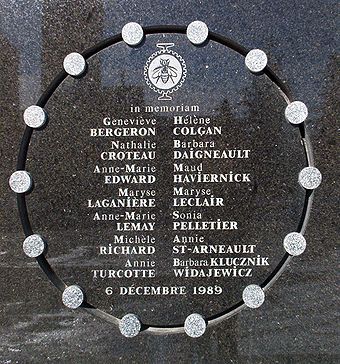National Day of Remembrance and Action on Violence against Women Events & Info
Region 1 Saint John 50/50 Draw
December 6, 2013Deadline for Issue Proposals
December 4, 2013

EVENTS:
Region 1 Saint John members are invited to a memorial event Thursday, Dec 5th at 7 pm uptown at the UNBSJ Grand Hall across from City Market (Charlotte Street side) former Scotiabank Building. Also to commemorate the Day of Remembrance the Local 506 Women’s Committee in Saint John are having a 50/50 draw with the proceeds donated to the Women’s Wellness Clinic at St. Joseph’s in memory of the 14 women that lost their lives 24 years ago on December 6, 1989.
Region 2 Moncton members are invited to participate in a Candlelight Vigil Friday, Dec 6th at 6:30 pm at the F. Dan Bohan Centre, 5 Fatima Drive, next to Riverview Town Hall followed by a candlelight vigil and laying of the roses at the monument at Caseley Park. For more info: 852-9609. Organized by the Dec 6th Committee of the Moncton and District Labour Council.
Region 3 Fredericton members are invited to participate in the White Ribbon March on December 9th at 12:15 pm at the Officer’s Square: Queen St at Regent St in Fredericton. This march is an event to bring together all genders and provide an opportunity for men to stand up and speak out against violence against women. Men will be invited to march from Officer’s Square to City Hall as a sign of solidarity with all the womein in their life who experience violence, discrimination and oppression. There will then be a free BBQ. While the march itself is for men and boys to show solidarity, all are welcome, regardless of gender.
STATEMENT:
December 6: We work for change
In the ongoing struggle to end violence against women, much has changed since December 6, 1989.
On that day, 24 years ago, a lone gunman entered L’Ecole Polytechnique in Montreal and separated the women from the men yelling “I hate feminists.” He then systematically murdered 14 female engineering students – women who were shot dead solely because they were women.
That day, 24 years ago, will be forever burned into the minds of a nation who struggled to comprehend the worst gender-based massacre in Canadian history and the labour movement was no exception. In the wake of what is now known as the Montreal Massacre, intense dialogue took place both inside and outside of the labour movement. Activists demanded that governments, employers and society address gender-based violence and engage in political action as they never had before.
Within the union movement, as a result of sustained, committed work to understand and address violence against women, many positive changes have been gained at the bargaining table since 1989. Unifor’s own collective bargaining achievements include anti-harassment policies and complaint procedures, right to refuse work based on harassment, harassment prevention training and the Unifor Women’s Advocate Program. With this work, the union has been successful in changing attitudes both in and outside our workplaces.
But as a union we also understood the need to lead the fight on ending gender-based violence outside of the workplace by pushing for legislative measures on issues like gun control, child care, minimum wage standards and affordable housing – all initiatives that provide women with the means to leave violent relationships.
We know that 24 years later, there’s still so much more to do.
Today in Canada violence against women is still a serious, pervasive problem crossing every social boundary and affects communities across the country. According to recent Statistics Canada research, on average, every six days a woman in Canada is killed by her partner. And on any given day, there are more than 3,000 women (along with their 2,500 children) living in emergency shelters, to flee domestic violence. Many more women suffer in silence due to lack of adequate resources to support women shelters – often in rural and remote communities across Canada. Violence remains a significant barrier to women’s equality and we know it has devastating consequences in the lives of women, children and families and Canadian society.
The United Nations has called on all countries to develop a national action plan on violence against women by 2015. On the 24th anniversay of the Montreal Massacre we once again urge the Federal Government to initiate a process to begin to develop a plan, involving provincial territorial and Aboriginal governments as well as civil society, service providers and survivors of gender-based violence. Canada’s national action plan needs to include legislation as well as specific resources ansd strategies for those most vulerable to violence: Aboriginal women, immigrant women, women with disabilities and young women. Canada’s plan must also provide sufficient resources for the strategies to be implemented, including support for research to measure progress.
As we prepare for Canada’s National Day of Remembrance and Action on Violence against Women on December 6, Unifor is working in collaboration with the Canadian Labour Congress and the Centre for Research and Education on Violence Against Women and Children at Western University, in London Ontario to launch a national online survey to gather data on the prevalence and impact of domestic violence in the workplace.
There is a lot we can learn about our workplaces to bring about lasting solutions in the lives of women and their families. This research will be an important first step to improving policies to respond to the impact of domestic violence in the workplace. The project, titled “Can work be safe when home isn’t?” will be the first ever Canadian national survey on this issue.
The survey is online and available in English and French until June 6, 2014. Any worker over the age of 15 is encouraged to complete the survey, whether or not they have personally experienced or witnessed domestic violence. It is completely anonymous and takes between 10 and 30 minutes to complete.
We need your help to spread the word. December 6 is an occasion to remember young women who lost their lives to gender-based violence. But it is also a time to commit to action. Unions are unquely placed to make a real difference to the lives of workers who may be experiencing violence in the home. And that makes work safer, for everyone.
To order posters or bookmarks to promote the survey in your workplace, please email the workroom at workroom.pc@unifor.org
To complete the survey in English or French, or learn more about what participation involves, please visit www.fluidsurveys.com/s/DVatWork (English) or www.fluidsurveys.com/s/violence_conjugale (French)




